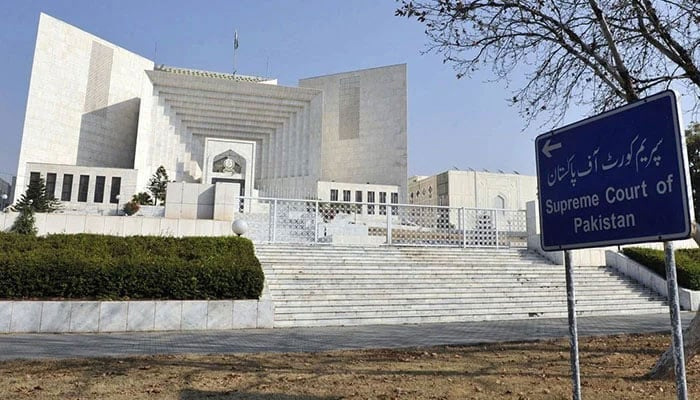Proclaimed offender can contest polls: SC
Nomination papers of petitioner for NA from NA-49, Attock-1, was rejected by RO on Dec 30, 2023, mainly on ground that petitioner was a proclaimed offende
ISLAMABAD: The Supreme Court has held that there is no law that makes a proclaimed offender disqualified from contesting elections.
A three-member bench of the apex court, headed by Justice Syed Mansoor Ali Shah and comprising Justice Jamal Khan Mandokhail and Justice Athar Minallah, issued a written order in an appeal filed by one Tahir Sadiq.
The nomination papers of the petitioner for the National Assembly from NA-49, Attock-1, was rejected by the Returning Officer (RO) on December 30, 2023, mainly on the ground that the petitioner was a ‘proclaimed offender’.
However, on appeals of the petitioner, the Appellate Tribunal accepted his nomination papers on January 6, 2024. Thereafter, the respondent filed writ petitions before the Lahore High Court, which were decided on January 16, 2023, and the nomination paper of the petitioner was once again rejected on the ground that the petitioner was a proclaimed offender.
“Articles 62 and 63 of the Constitution read with Sections 231 and 232 of the Act provide for qualification and disqualification of a candidate, which does not mention that a ‘proclaimed offender’ is disqualified from being elected or from being a member of parliament,” said the written order authored by Justice Mansoor. The court held that the grounds provided for rejection of a nomination paper in Section 62(9) of the Act also do not empower the ROs to reject the nomination paper of a candidate on the ground of his being a proclaimed offender.
“Although no provision of the Act has been pointed out to us that requires the necessary presence of the candidate during the electoral process, we may observe that if there is any such provision, the absence of the candidate may have its own consequences under that provision, but his nomination paper cannot be rejected on such ground unless the legislature so provides in Section 62(9) of the Act,” said the apex court order. The court held that the high court made a legal error in rejecting the petitioner’s nomination paper on the ground of his being allegedly a proclaimed offender.
“Elections stand as a manifestation of the collective will of a nation, reflecting the diverse voices and choices of its citizens,” said the order, adding that in the democratic process, individuals exercise their right to vote, contributing to the formation of a representative government. The court held that the rights involved were not only of those participating in the elections but also of the public. “The courts, in their role as guardians of democracy and fundamental rights, should approach electoral matters with circumspection, ensuring that their interventions uphold the democratic principles upon which the nation thrives and the fundamental rights of citizens to contest elections and vote for the candidates of their choice,” said the order. The court accepted the appeal of the petitioner, set aside the orders of the high court, and accepted the nomination paper of the petitioner for the seat of a National Assembly member from NA-49. The court directed that the Election Commission of Pakistan (ECP) must ensure that all the necessary steps to be taken in the electoral process were completed forthwith, so that the petitioner could contest the election on the scheduled date for the said seat, without fail.
-
 Funeral Home Owner Sentenced To 40 Years For Selling Corpses, Faking Ashes
Funeral Home Owner Sentenced To 40 Years For Selling Corpses, Faking Ashes -
 Why Is Thor Portrayed Differently In Marvel Movies?
Why Is Thor Portrayed Differently In Marvel Movies? -
 Dutch Seismologist Hints At 'surprise’ Quake In Coming Days
Dutch Seismologist Hints At 'surprise’ Quake In Coming Days -
 Australia’s Liberal-National Coalition Reunites After Brief Split Over Hate Laws
Australia’s Liberal-National Coalition Reunites After Brief Split Over Hate Laws -
 DC Director Gives Hopeful Message As Questions Raised Over 'Blue Beetle's Future
DC Director Gives Hopeful Message As Questions Raised Over 'Blue Beetle's Future -
 King Charles New Plans For Andrew In Norfolk Exposed
King Charles New Plans For Andrew In Norfolk Exposed -
 What You Need To Know About Ischemic Stroke
What You Need To Know About Ischemic Stroke -
 Shocking Reason Behind Type 2 Diabetes Revealed By Scientists
Shocking Reason Behind Type 2 Diabetes Revealed By Scientists -
 SpaceX Cleared For NASA Crew-12 Launch After Falcon 9 Review
SpaceX Cleared For NASA Crew-12 Launch After Falcon 9 Review -
 Meghan Markle Gives Old Hollywood Vibes In New Photos At Glitzy Event
Meghan Markle Gives Old Hollywood Vibes In New Photos At Glitzy Event -
 Simple 'finger Test' Unveils Lung Cancer Diagnosis
Simple 'finger Test' Unveils Lung Cancer Diagnosis -
 Groundbreaking Treatment For Sepsis Emerges In New Study
Groundbreaking Treatment For Sepsis Emerges In New Study -
 Roblox Blocked In Egypt Sparks Debate Over Child Safety And Digital Access
Roblox Blocked In Egypt Sparks Debate Over Child Safety And Digital Access -
 Savannah Guthrie Addresses Ransom Demands Made By Her Mother Nancy's Kidnappers
Savannah Guthrie Addresses Ransom Demands Made By Her Mother Nancy's Kidnappers -
 OpenAI Reportedly Working On AI-powered Earbuds As First Hardware Product
OpenAI Reportedly Working On AI-powered Earbuds As First Hardware Product -
 Andrew, Sarah Ferguson Refuse King Charles Request: 'Raising Eyebrows Inside Palace'
Andrew, Sarah Ferguson Refuse King Charles Request: 'Raising Eyebrows Inside Palace'




